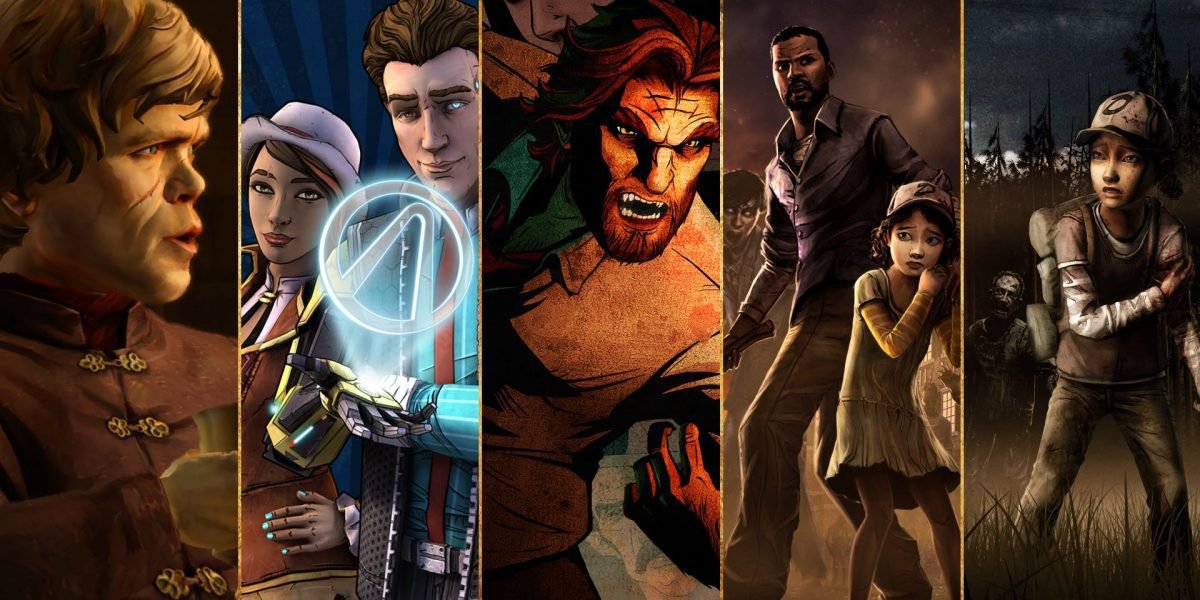Conception
LucasArts was known for its profoundly good graphic-adventure games in the late 80s and 90s, with cult classics like Monkey Island and Sam & Max. As years passed, the studio wanted to evolve and start making other kinds of games because the interest and popularity of adventure games began diminishing, hence they ended up cancelling Sam & Max: Freelance Police in 2004. Passionate employees Dan Connor, Kevin Bruner and Troy Molander quit to form their own company: Telltale Games. The main objective of this company was to keep the genre of point-and-click adventure games alive.
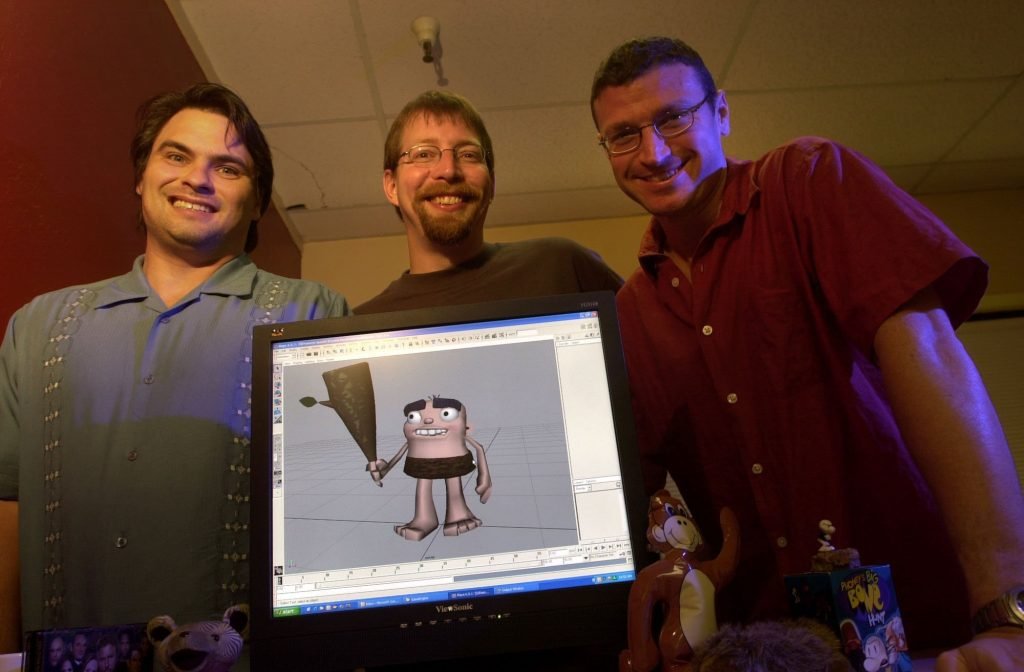
The Rise & Fall of Telltale Games
Image credit: Marin Independent Journal
The first thing they ever released was Telltale Texas Hold’em in early 2005; it featured original characters and was really just an interactive tech demo of their Telltale Tool than anything else.
Their first ever adventure game came out later the same year, and was a faithful recreation of the Bone series by Jeff Smith. In the next year, Telltale developed CSI: 3 Dimensions of Murder and was published by Ubisoft. Although both the games didn’t make a big splash and garnered mix-reviews, Telltale was able to prove that they can create pretty decent games out of already established IPs.
First Break
Telltale Games got their first break when the creator of Sam & Max, Steve Purcell approached them in mid-2005. LucasArts’ license for the franchise was about to expire, and he was interested in passing the license onto Telltale if they were interested in making a new Sam & Max game. Considering how the cancelation of a Sam & Max game was the leading cause to the studio’s formation, they quickly jumped at the opportunity. They released the first episode of Sam & Max: Save the World in the October of 2006, which would turn out to be their first critical hit.
Leading on to that success, they began making more adventure games over the course of the next few years including the likes of more Sam & Max sequels, a Homestar Runner game, a Wallace & Gromit game, as well as reviving the Monkey Island series. Even though all their games during the time were mainly niche-focused, they received generally positive reviews and solidified Telltale’s place in the industry.

Image credit: YouTube, u/FootofaFerret
Focus Shift
Telltale initially focused exclusively on cartoony, comically-funny adventure games with witty writing that appealed to a very niche category of gamers. As their games began earning more consistently positive reviews, it was time for the studio to step out of their comfort zones and take on bigger projects.
Once they earned the license to two of the biggest, most popular Universal’s IPs: Back to the Future and Jurassic Park in 2010, they began to shift their focus and attempted to create more serious, narrative-focused games. Their efforts paid off in the end, almost.

The Rise & Fall of Telltale Games
Image credit: Old Is Gold
Back to the Future: The Game and Jurassic Park: The Game received some very contrasting reception. On one hand, Back to the Future: The Game was their biggest hit yet, it was widely regarded by Back to the Future fans as the spiritual successor to 1990’s Back to the Future Part III and also did great in terms of sales.
Meanwhile, on the other hand Jurassic Park: The Game absolutely bombed. Firstly, players hated that it was not a point-and-click adventure game, which was the format that they adored and expected from Telltale. The lack of gameplay elements heavily criticized by long-time fans, and some even called the interactive-movie style a blatant rip-off of Quantic Dream’s PlayStation exclusive, Heavy Rain.
Despite all the criticism, Telltale Games surprisingly decided to stick with the interactive movie style. They were determined to learn from their mistakes, and not repeat the ones they made in Jurassic Park.
The Rise
By sticking with their failed interactive movie format, Telltale was able to bring us their best game till date: Telltale’s The Walking Dead. By bringing Robert Kirkman’s comic panels to life with their unique, comic-book art style, memorable characters and heavy focus on the choice-consequence system, the first episode of The Walking Dead gave birth to a whole new phenomenon when it launched in April of 2012.
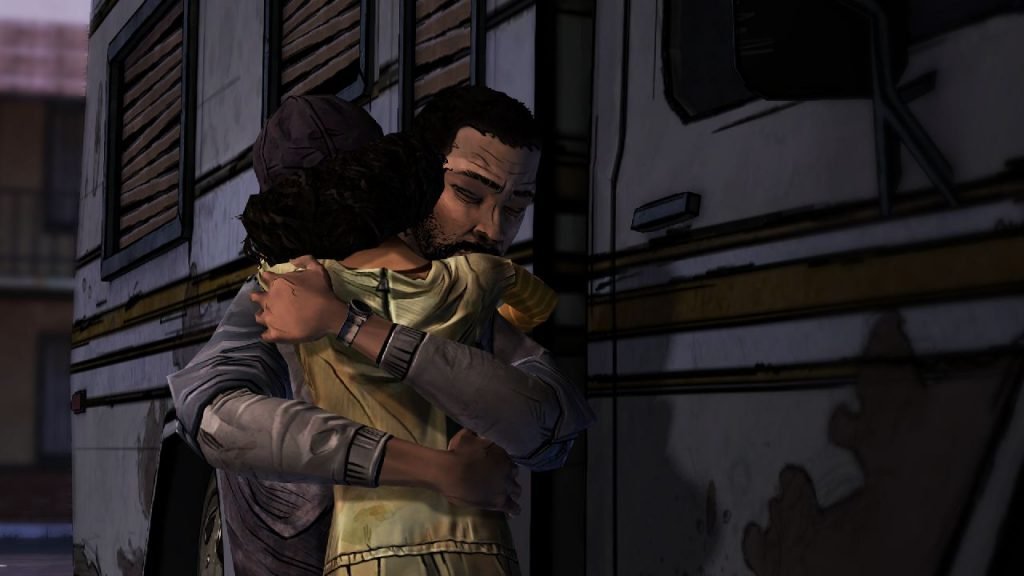
The Rise & Fall of Telltale Games
Image credit: Polygon
Each episode of the game sold incessantly, and the relationship between protagonists Lee and Clementine stole the hearts of players around the world. The game was available on every platform available at the time making it quite accessible, and the limited gameplay elements meant that the game was appealing even to casual gamers and people who’d never played a videogame before. You probably know someone who made a Steam account or bought a console just to play this game, that’s how big it was at the time. The game was a popular choice among YouTubers; the fans of the TV show picking up the game didn’t hurt the sales either.
Not only did the game blow up commercially, but it also was critically acclaimed and brought made Telltale Games mainstream. It was called the greatest game in the genre and the game that breathed life into a genre that had been languishing for decades, these claims were supported by the over forty “game of the year” awards it earned during that year.
At this point the company expanded, and started working on multiple projects at a time. The next most notable one being The Wolf Among Us, an adaptation of Bill Willingham’s popular Fables comics, which also crossed a million in sales figures. Things were looking up for the studio, and they were acquiring licenses to more popular IPs and embarking on more ambitious projects.
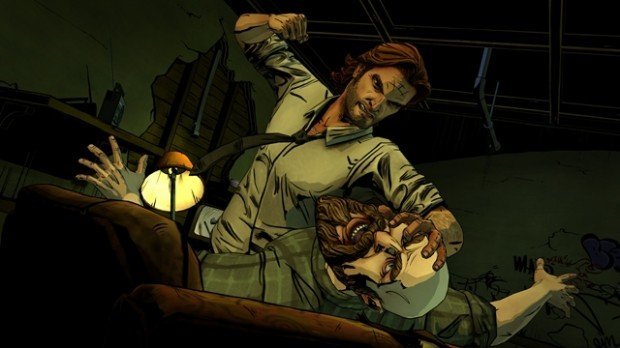
The Rise & Fall of Telltale Games
Image credit: US Gamer
The Fall
As the company got more successful and ambitious, their attitude towards making games started to change too. The executives commercialized the game-making process and driving up sales became their only aim. The creative freedom was curbed, and there were long work hours and the adoption of crunch culture to meet tight deadlines and churn out games for shipment. In fact, the working conditions got so bad that co-creators of their flagship Walking Dead series, Sean Vanaman and Jake Rodkin left amidst the second season to form Campo Santo studios.
The biggest problem with Telltale was you couldn’t do what you thought was good, you had to do what you thought the executive would think is good. And that was like an overarching wire grip on the entire creative thing at the studio and I think that was the source of most of its problems.
Kent Mudle, ex-Creative Director at Telltale
During the years between 2013 to 2017, they released a whopping number of eleven games which all followed the identical winning formula of Walking Dead and brought no improvements to it. All of the games even had the same comic-book art style, even when it made no sense with the particular title. This repetitiveness led to burnout and the players were just tired of the same old formula. The reputation tanked once players got the feeling that their games only provided an illusion of choice, and that their choices ultimately do not carry any weight.
The games weren’t selling like they were used to, and even though some of the newer games saw decent interest during launch, they weren’t able to retain their audience for the later episodes. As a result, they were getting way too little return on investment for all the expensive IPs they bought the license to, and had to pay a hefty amount of royalties on top of that.
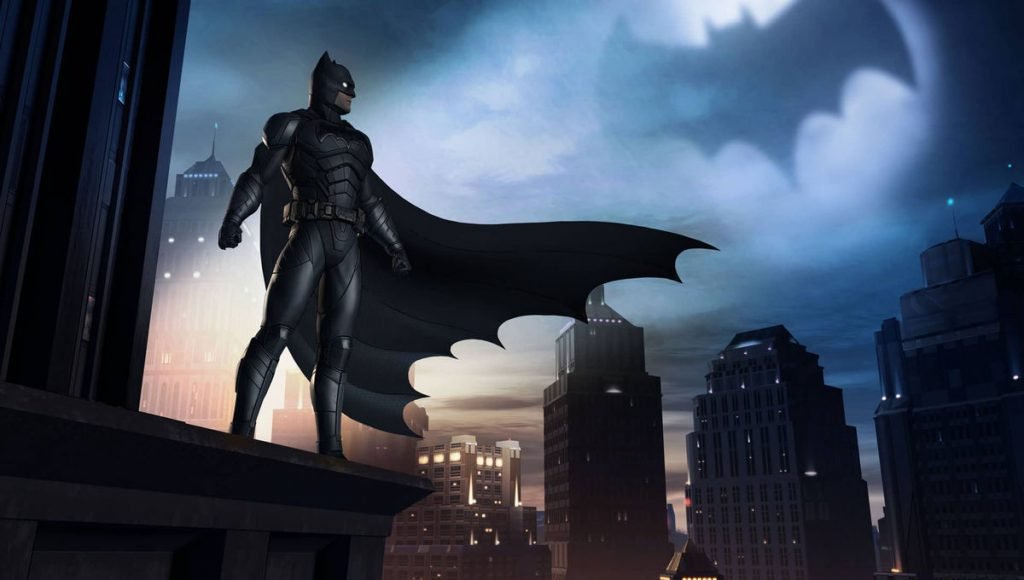
The Rise & Fall of Telltale Games
Image credit: Syfy Wire
The first wave of layoffs happened in 2017, after which rumours about abusive management of then CEO Kevin Bruner began to surface. This eventually led the board to push his resignation and co-founder Dan Connor took over as the new CEO. After another five months, Zynga’s Pete Hawley took over as the CEO to try and prevent this ship from capsizing.
The creative restrictions did go away with Bruner, and this is pretty evident seeing the creative risks that they took with the second season of Batman producing great results, but it was all too little too late. The people at Telltale thought the good times were back again, but little did they know what was going on behind the scenes. They were enthusiastically working on multiple projects, when the new CEO announced a majority studio closure out of the blue in September 2018.
The workers were laid off without a notice in advance. They didn’t receive severance pay and had only two weeks of health insurance left. Projects like Stranger Things and The Wolf Among Us 2 were cancelled and the season finale of Walking Dead was cancelled mid-season. The rumours suggest that their major investor backed off at the last moment and the top management didn’t have a backup plan for such a situation. The new CEO failed to secure funding, and wasn’t transparent about the financial position to the employees. The employees had to exit the building in merely thirty minutes, with a few of them left to complete the second season of Minecraft and for PR work. Many of them had to move across the country to work in a different industry, some got jobs in other gaming companies like Bungie and Bethesda and others are unfortunately still out of employment.
This was actually against the law in California, and resulted in a class-action lawsuit against the company, that’s how the studio met its tragic end. To learn more about the experience of Telltale’s former employees, click here to watch NoClip’s documentary.
Renaissance
The cancellation of their flagship Walking Dead’s amidst the season finale was a shock to the developers, voice actors and audiences. Skybound Entertainment, the publishers of Robert Kirkman’s comic had been working closely with Telltale since the first game. They took the opportunity to bring Clementine’s story closure, as well as expand their business with Skybound Games. They finished the game with the help of The Final Season’s creative lead at Telltale, Kent Mudle.
In August of 2019, LCG Entertainment relaunched the Telltale brand after acquiring most it’s assets along with the back-catalogue rights to The Wolf Among Us and Batman. According to a report last year by Polygon, they are planning to continue making new and familiar games, while dynamically changing up their business model to not make the same mistakes as the old Telltale did. It’s reassuring to know that the new founders did give freelancing contracts to former employees, with a potential for long-term employment in the future.
The Wolf Among Us 2 was officially announced at last year’s The Game Awards ceremony. We speculate the third season of Batman to be announced very soon.
Telltale’s Legacy
It’s undeniable how much of an impact Telltale’s games have had on the industry in the past decade and a half. It led to the resurgence and newfound interest of gamers in the adventure games genre, and it sparked the interest for more narrative-focused games. It pioneered the episodic release structure of games, and inspired many successful releases such as Dontnod’s Life is Strange series, Capcom’s Resident Evil: Revelations and even the more recent Xbox exclusive, Tell Me Why.
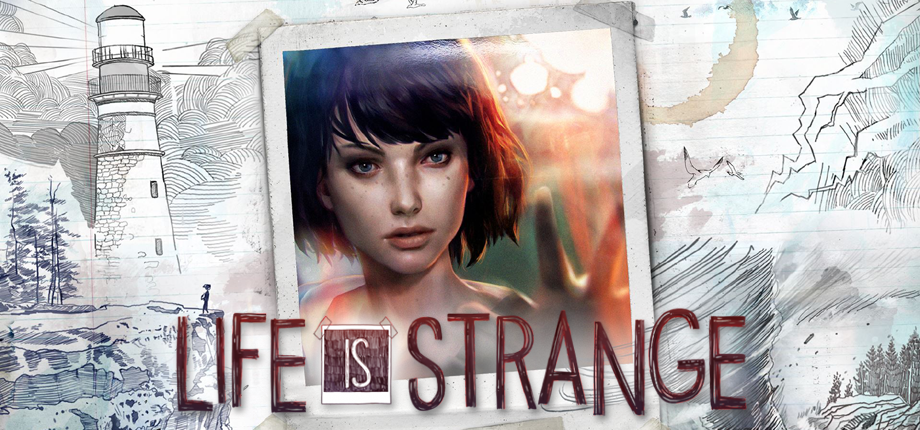
The Rise & Fall of Telltale Games
Image credit: Steam
Their games gave birth to a whole new breed of gamers, shifted the focus to narrative-driven and choice-oriented games and set new standards for relationships and character building in video games for ever. Their modern classics left us with gripping character moments, and some of the most impactful stories we’ve experienced in any medium.
We hope that the new Telltale Games will continue to bring us these wonderful stories, both new and old ones, and not repeat any of their old mistakes. Telltale will remain as one of the most influential video game creators in history, and the characters will remain forever in our hearts. All of us at GDGT would like to take this opportunity to thank every former and current employee at Telltale for your hard work and long hours; you gave us some of our most special, most emotionally tear-inducing video game experiences of our lives.
What new IP would you love to see become a Telltale game? Let us know in the comments. For more on video games, you’re already at the right place.
